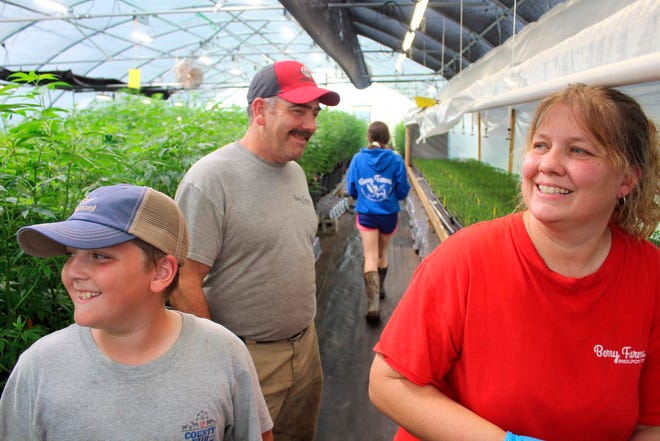Raising hemp a learning experience for Philpot family

PHILPOT, Ky. (AP) - The federal legalization of hemp through the Hemp Farming Act, a part of the 2018 Farm Bill, has brought seasoned farmers and would-be gold rushers alike into the hemp game.
For those neo-farmers hoping to cash in, hemp represents the potential of a hefty payday. For the salt-of-the-earth, seasoned farmer, hemp represents a challenging new crop that could supplement existing operations.
Philpot farmer Curtis Berry, like many farmers in Kentucky, is trying his hand at hemp in its first season. Berry, a third-generation farmer and owner of Berry Farms, has been farming his entire life, he said.
Like many small farmers, Berry's family farm is a diversified operation that consists of the cultivation of corn, beans, cattle, hay, tobacco and now, hemp, he said.
For the past 25 years, he and his family have been, aside from fulfilling their own 32,000-pound dark air-cured tobacco contract, providing young greenhouse grown tobacco plants to other farmers to the tune of roughly 550,000 each season. This season however, due to tobacco cuts, he was worried that he may not be able to fill his second greenhouse. That's how a relationship began with Adam Martin and Tate Hall of Terra Farma, a Hardinsburg-based hemp processing company.
"I have been looking at it for two or three years and it just didn't look that promising before," he said. "It started to look a little better every year. ... Tate and Adam were going around to try and get people to sign contracts and look for new growers and somebody to do the greenhouse end of it. I have the greenhouse and figured I would give it a try."
Martin aided the Berrys in retrofitting a former tobacco greenhouse into a hemp conducive one as well as in the process of developing and maintaining the hemp plants.
"Adam came in, and he is very knowledgeable and has provided really great greenhouse support," he said. "This is my first year. It (hemp) doesn't even compare to tobacco. As far as the greenhouse aspect, it is a lot more hands-on. With tobacco, we have a routine, and of course, we have doing it for years, but we have a routine where we know what to do. But this stuff here is not like that. You have to watch the plant and give it what it needs because every plant is different, every variety is different."
Currently, the Berrys have seven varieties growing in their greenhouse. It has been a family affair to hit their target of 70,000 hemp plants to be sold to certified farmers at $4 a pop, Ellen Berry, Curtis Berry's wife, said.
With the help of a friend and their four children: Anna, 21, Sarah, 16, Mollie, 14, and Jonathan 10, the family has been able to find success.
"I love it," Ellen Berry said. "I was cautiously optimistic when the idea came up, but I love being out here. It is a 24-hour process. There are a lot of little things that you don't think of and everything takes time. There is nothing quick and easy about the process, so if you don't enjoy it, it won't work. If we weren't all pitching in, we would be out here until midnight every night, which still happens sometimes."
As far as growing hemp, the Berrys are taking it slow, opting to try a couple of acres in the first growing season to learn about the crop and any potential issues that might arise, Curtis Berry said.
"Everybody has their own ideas of what might work and might not," he said. "Guys are sharing what they are learning, which is why I went to Terra Farma, for the background and the knowledge. I say they put me three years ahead in terms of what I learned from them. I would say farmers, anyone that has been raising tobacco and knows the hard work of it, will probably do fine with it. Somebody that has never raised a flower and puts out a couple acres, they might be in for a surprise."
Even experienced farmers will have to face a major learning curve when it is time to put their hemp out to grow, especially because they can only mitigate disease and insects organically as opposed to the use of pesticides and other chemical agents. Essentially, he is relearning his life-long profession, he said.
"It is a challenge," he said. "I mean you can use organic neem oil for one thing. It is like a leaf polish, which helps. It's not going to kill any bugs, but it will mess with their life cycle. There are some essential oils and teas and different things that you can use, but it will be a challenge in the field, it really will. I'm going to get a good fly swatter."
Regardless of the risk and lack of guarantee in terms of the future success and market of hemp, the Berrys are hopeful, for themselves and their fellow small farmers, he said.
"This could be good for smaller farmers," he said. "There is no guarantee with this — we could all be in a world of mess. There is a lot of uncertainty. There are no guarantees to any of it. We could all be on the wrong end you know. But, just like anything in life, you have to take a little risk to get on top. If you don't take a risk you won't go anywhere."